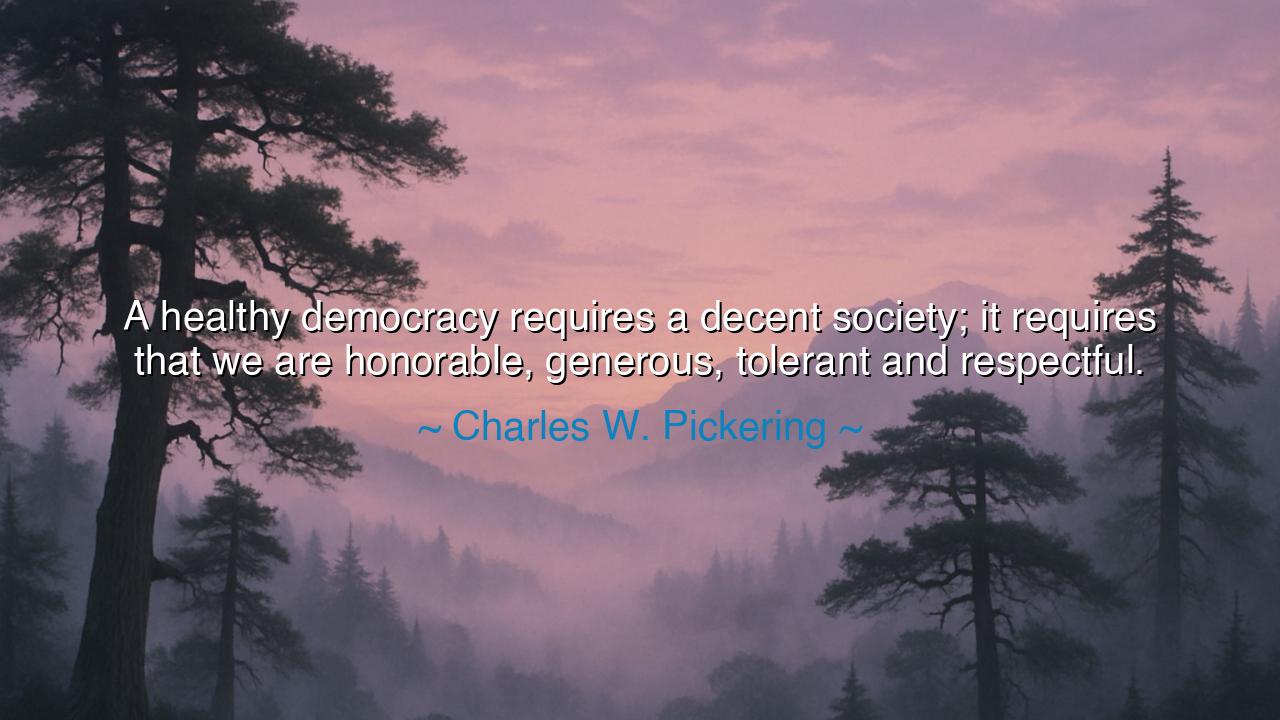
A healthy democracy requires a decent society; it requires that
A healthy democracy requires a decent society; it requires that we are honorable, generous, tolerant and respectful.






In the hallowed halls of history, there have been many great civilizations, each rising and falling with the ebb and flow of time. Yet, one truth stands above all others: the health of a democracy is not simply measured by the laws it enacts or the institutions it builds, but by the character of its people. In the wise words of Charles W. Pickering, “A healthy democracy requires a decent society; it requires that we are honorable, generous, tolerant, and respectful.” These words are not just a reflection of the present moment but a profound teaching, echoing through the ages, reminding us that the strength of any democracy is rooted in the integrity of its citizens.
The democracy of a nation is, at its core, a collective agreement—a pact between the governed and the government. It is a system built not on fear or coercion but on trust and mutual respect. However, the foundation of this trust is fragile, and without the virtue of the people, the very structure of democracy begins to crumble. Pickering’s words are a solemn reminder that a democracy is not simply a system of voting or representation, but a reflection of the moral character of those who participate in it. A democracy can only thrive when its people are honorable—when they act with integrity, when their word holds weight, and when their actions align with their principles.
In ancient Greece, the birthplace of democracy, this principle was deeply embedded in the culture. The Athenian democracy, which allowed citizens to engage in direct governance, flourished not just because of its political system, but because of the honor and civic duty of its citizens. Men like Pericles, who led Athens during its golden age, understood that a democracy could only endure if the people held themselves to high moral standards. Pericles urged the citizens of Athens to be generous, not only in their public service but in their willingness to serve the common good. This spirit of civic virtue was what gave Athens its strength, for each citizen knew that their honor was tied to the well-being of the society as a whole.
The story of Nelson Mandela in South Africa offers a more modern example of how the character of a society shapes the future of its democracy. In the face of apartheid, an unjust and deeply divided system, Mandela embodied the virtues of generosity, tolerance, and respect. He understood that the path to a healthy democracy would not be paved with hatred or violence, but with the moral strength to forgive, to build bridges, and to treat all people with equal dignity. His leadership during the transition from apartheid to a democratic South Africa was marked not by vengeance but by an unwavering commitment to peace and justice. In doing so, he showed the world that the moral character of a nation’s people is what ultimately sustains its democratic values.
Yet, as Pickering reminds us, the path to a healthy democracy is not an easy one. It requires constant effort and commitment from each member of society. It is not enough to simply elect leaders or to pass laws. A democracy thrives only when the people themselves embody the values of honor, generosity, tolerance, and respect in their daily lives. When we treat one another with dignity, when we listen with open hearts and minds, when we engage in conversations with a spirit of understanding rather than division, we fortify the very foundations of our democracy.
The lesson, then, is this: A democracy is not a passive institution; it is an active, living expression of the people who make it. It requires moral vigilance from every individual, for the strength of the whole rests upon the character of the parts. We must each be honorable in our actions, generous in our service to others, tolerant in our understanding of differences, and respectful in our dealings with one another. The future of any democracy depends not just on laws, but on the virtue of the people who follow them.
Let us, then, take this teaching to heart and understand that the health of our democracy begins with us. It begins with how we treat our fellow citizens, how we engage with our community, and how we hold ourselves accountable to the highest standards of integrity. Just as the Athenians and Mandela showed, it is not enough to only dream of a better society—we must embody the virtues that make it possible. If we wish to create a world of justice, equality, and peace, we must first create a society where each individual contributes to the greater good with honor, generosity, tolerance, and respect. In this way, we will ensure that our democracy remains vibrant, strong, and worthy of the future we hope to build.






AAdministratorAdministrator
Welcome, honored guests. Please leave a comment, we will respond soon